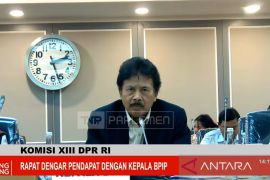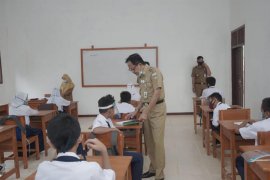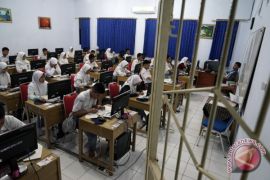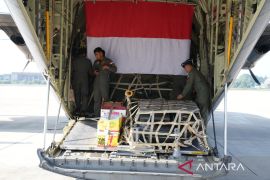Previous system of conducting the national examination put too much pressure on students, teachers and school administrators, but since last year, it has been changed to ensure there was less emphasis on testing. Also, it has ensured that the pressure on students and teachers is reduced and rampant cheating is curbed.
A total of 3,302,673 students of Senior High Schools, Vocational Schools and Madrasah Aliyah (Islamic Senior High Schools) across the country took part in the four-day national examination from Monday through Thursday.
Nizam, the head of Education Assessment Center at the Ministry of Education and Culture, remarked here on Monday that the method of conducting the national education examination this year was different from what used to happen previously.
He said in addition to conducting a paper-based test, some schools opted to have a computer-based test. The number of such schools continues to increase.
"Previously, only 594 schools implemented computer-based national examination but this year, the number of schools increased to 4,402 with around 927 thousand students," Nizam noted.
Further, he added that since many schools still use paper-based test, his party will continue to encourage all schools across the country to opt for computer-based test.
According to him, computer-based test is considered more efficient and minimizes the possibility of cheating.
Nizam stated that the national exam is used as a tool to measure students competence and map schools performance. It serves as a basis of selection for the next level of education.
Education and Culture Minister Anies Baswedan said the graduation of school students would no longer depend on merely their passing the dreaded national examination.
The minister noted that the graduation of students would be decided entirely by the schools through the school examination.
According to him, students who did not pass the national exam could retake it the following year as the new regulation allowed them to take the test more than once.
Therefore, Baswedan encouraged the high school students not to exert themselves too much to pass the National Examination 2016.
"The students should no more force themselves to do well in the national exam. They must remain relaxed," Baswedan remarked here last Friday.
He encouraged the students to stay relaxed so that they remain fit and are able to focus on the test.
The national examination was simultaneously conducted nationwide on March 4 to 7, 2016. Students of Senior High Schools, Vocational Schools, and Madrasah Aliyah (Islamic Senior High Schools) participated in it.
Religious Minister Lukman Hakim Saifuddin visitied two Madrasa Aliyahs in Lenteng Agung, South Jakarta, and in Serpong, Tangerang, to observe the national examination process on Monday.
"The national exam is an element of the education system to determine the actual quality mapping of schools," the minister remarked at the State Madrash Aliyah 13 (MAN 13) in Lenteng Agung, South Jakarta.
Saifuddin also noted that the national examination this year was not an absolute basic determinant of the students graduation and the same was determined by educational units, or schools.
According to the minister, more than 410 thousand students of 759 Madrasah Aliyah across the country attempted the national exam on Monday, and his visit to the schools in Lenteng Agung and Serpong was to ensure that the students appeared in the test in an orderly, safe and honest manner.
Saifuddin explained that of the nations 759 Madrasah Aliyah, only 75 were able to implement the computer-based national exam this year.
Therefore, the religious minister expressed the hope that all Madrasah Aliyah and Islamic Junior High Schools (Madrasah Tsanawiyah) would implement the computer-based test in the years to come.
"The computer-based national examination is encouraging, and therefore, we hope that all Madrasah Aliyah and Madrasah Tsanawiyah would implement it in the coming years," the minister emphasized.
He affirmed that the computer-based national exam was part of the shift towards an arrangement that deploys the latest technology, and this cannot be avoided anymore now.
Saifuddin pointed out that the test offered a high level of transparency and more accuracy. It was in line with the Religious Ministrys efforts to boost achievements and uphold the principle of honesty.
"The computer-based national exam is important as through such a test, incorrect practices in which certain groups of people use dto indulge can be minimized or eliminated altogether," he added.
In the Indonesian province of West Papua, Governor Abraham Atururi also visited three state senior high schools in Manokwari District to observe the national examination process.
During his visit to the schools that had conducted a computer-based test, the governor stated that the national exam was held in an orderly and timely manner in accordance with the schedule.
"All students attended the national examination, which took place in an orderly and smooth manner, as expected, in West Papua," Governor Atururi remarked in Manokwari on Monday.
According to the governor, all the students appeared cheerful and were ready for the test. He urged them to attempt the test carefully and honestly.
Atururi expressed the hope that all students in West Papua would clear the national examination with good scores.
"Whether the students with high scores in West Papua will be granted scholarships is an issue that will be considered later, but for now, the focus should be on the test," the governor noted before the test was conducted.
Besides Governor Atururi, Manokwari District Head Demas Paulus Mandacan also separately observed the process of the national exam at these schools.
Mandacan also hoped that the test would yield optimal results for all students, and next year, all schools in the district would implement the computer-based national exam.(*)
Reporter: Otniel Tamindael
Editor: Heru Purwanto
Copyright © ANTARA 2016











